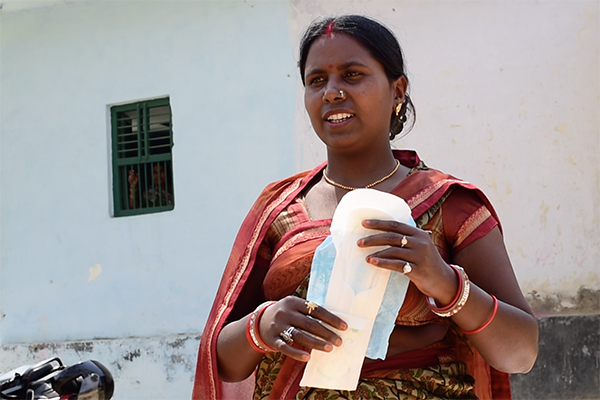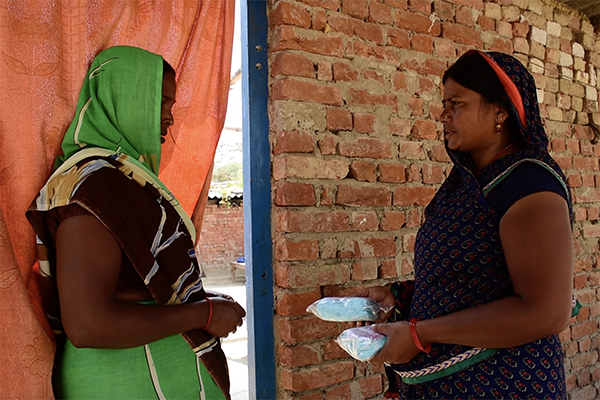Everything you need to know about period poverty

Health leader Poonam gives a talk about menstrual hygiene to a group of women in a village in Bihar, India. © Matthew Smeal
More than 800 million people menstruate daily. It’s a normal and healthy part of life for most women and girls.
But for a woman living in poverty, her period can be a source of stress and shame. In addition to meeting her family’s daily needs—food, water, shelter and education—she must find a way to access enough pads or tampons each month. Period poverty comes in many forms: a lack of access to sanitary products, menstrual hygiene education, toilets and hand washing facilities, or waste management.
Here is everything you need to know about period poverty.
Affodability is a barrier
For many low-income households, the cost of sanitary pads makes them unattainable – in some cases women are not aware of them at all. In India, about 12 per cent of its 355 million menstruating women cannot afford period products.
Affordability, cultural taboos and lack of health education are just some of the barriers preventing women from accessing sanitary products. But it’s not all bad news. In 2018, India scrapped its 12 per cent tax on sanitary products following months of campaigning by activists. A small win, in the fight to end period poverty.
Health risks increase
In India, only 48 per cent of women in rural areas use sanitary pads, according to the National Family Health Survey. Women and girls are resorting to dangerous methods to manage their periods, such as traditional cloths or even sawdust. Cloths are washed and dried discreetly, often stored in damp and unhygienic conditions. Unclean rags can harbour bacteria, leading to reproductive and urinary tract infections.
"In India, women are considered dirty or impure during their menstrual cycle."
At Opportunity, we are dedicated ensuring women living in poverty have access to the knowledge and products they need to manage their periods. Our trained community health leaders teach women and girls about menstrual hygiene, warning against the dangers of cloth, particularly as traditional cotton is being increasingly replaced by cheaper modern fabrics like polyester.
Community health leaders also sell health care items, such as sanitary pads, to earn a sustainable income. This also allows women to purchase vital products immediately without needing to travel to larger towns.

A community health leader sells sanitary napkins to a woman in Bihar, India. © Matthew Smeal
Menstrual stigma persists
For many women, their periods are a time of embarrassment, fear and shame. Periods are still considered taboo in many cultures, leading to a lack of knowledge and unhygienic practices. In India, women are considered dirty or impure during their menstrual cycle. They may be barred from socialising, entering places of worship, and school becomes difficult and embarrassing. Such misconceptions and myths can lead to discrimination and shame.
Opportunity’s community health leaders are breaking down the stigma by educating women about menstrual hygiene. More women are beginning to talk openly about this natural part of life, one health presentation at a time.
Education is key
Due to their periods, girls often miss significant amounts of school each month – as time continues, some find that they have fallen too far behind and simply stop going altogether. Others tire of the shame, embarrassment and stigma. In India, over 20 percent of girls stop going to school completely after reaching puberty.
Managing periods during school hours can be difficult, even with access to sanitary products. Globally, 2 billion people lack access to basic sanitation facilities, such as toilets or latrines – this includes in schools. Without a way to safely manage their periods, many girls miss school, and with it, the opportunity to learn.
"When girls stay in school they have a greater chance of finding secure, sustainable employment."
Education also impacts health outcomes. Women with 12 or more years of schooling are more than four times as likely to be using a hygienic method to manage their periods than women with no schooling. Educating girls—and boys—about menstruation builds girls’ confidence, encourages healthy habits and reduces stigma. When girls stay in school they have a greater chance of finding secure, sustainable employment and will lead healthier lives.
While the knowledge surrounding menstruation is increasing and women are talking more openly, there is still a long way to go in the fight to end period poverty.
Opportunity is dedicated to supporting women living in poverty to thrive, not just survive.